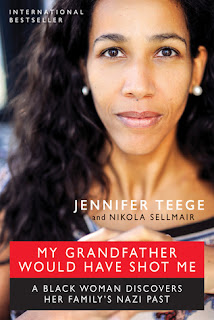My Grandfather Would Have Shot Me: A Black Woman Discovers Her Family’s Nazi Past by Jennifer Teegee and Nikola Sellmair
My Grandfather Would
Have Shot Me: A Black Woman Discovers Her Family’s Nazi Past by Jennifer
Teegee and Nikola Sellmair
Jennifer
Teegee was browsing through the library in Hamburg when she came across a book
titled I Have to Love My Father, Don’t I?
The Life Story of Monica Goeth, Daughter of the Concentration Camp Commandant
from “Schindler’s List.” Monica Goeth is Jennifer’s biological mother.
Monica placed Jennifer in an orphanage when she was an infant and she had been
adopted at the age of 7. She never had a great relationship with her mother,
but she did love the company of her maternal grandmother, Irene. Irene was the
woman who loved Amon Goeth, the Commandant. Now all Jennifer has is questions
about her family, about her life, about the grandfather she saw portrayed in a
movie by Ralph Fiennes. He was the man shooting people in the camp from his
window. She writes “He in his black
uniform with its death-heads, me the black grandchild. What would he have said
to a dark-skinned granddaughter, who speaks Hebrew on top of that? I would have
been a disgrace, a bastard who brought dishonor to the family. I am sure my grandfather
would have shot me.” Now Jennifer is trying to put the pieces of her
family’s history together. This memoir is her journey to discovering the
secrets she had never been told.
What
does your family legacy say about you? How does the past actions of family
members dictate the rest of your life? Should it even have an effect on your
life? These were a few of the questions Jennifer wrestled with throughout this
memoir. She felt as if her life was split in two: the time before knowing and
the time after. What was amazing is the life she chose to have before knowing
about her grandfather. She lived in Israel, learned Hebrew, studied the
Holocaust, volunteered and had Jewish friends. But what does any of that mean
now, after knowing the horror that your grandfather put people through. These
are somewhat unanswerable questions. But through this memoir you can see how
she learned to cope and live with her family’s history. The love of the family
that adopted her and had been a part of her life for three decades helped. But
this was a journey she had to take on largely by herself.
This
memoir brings up so man valid points. It’s hard to describe. If you have
someone in your family who has done terrible things, should you be held
accountable? Is that a weight others should have to carry? What about others
who were ambivalent to the things around them like Irene, Jennifer’s biological
grandmother? She was living with Amon outside of the concentration camp. How
should Jennifer feel about her, especially when she had such fond memories of
her grandmother? It’s so complicated and there are no easy answers but her
journey is something I can recommend others read. There is a lot of
introspection, a lot of research and a certain amount of acceptance. This
really is the story of her life and how this new knowledge changed everything
for her. My biggest complaint comes from the way this memoir is presented:
Jennifer writes part of it in first person narrative while other, more factual,
parts are written by Sellmair. These different narratives were present in each
chapter and it was really awkward. The choice of format made me rate this a
little lower because reading the memoir like this did get tiresome. Still will
recommend this and give it 3.5 out of 5 stars.




Comments
Post a Comment